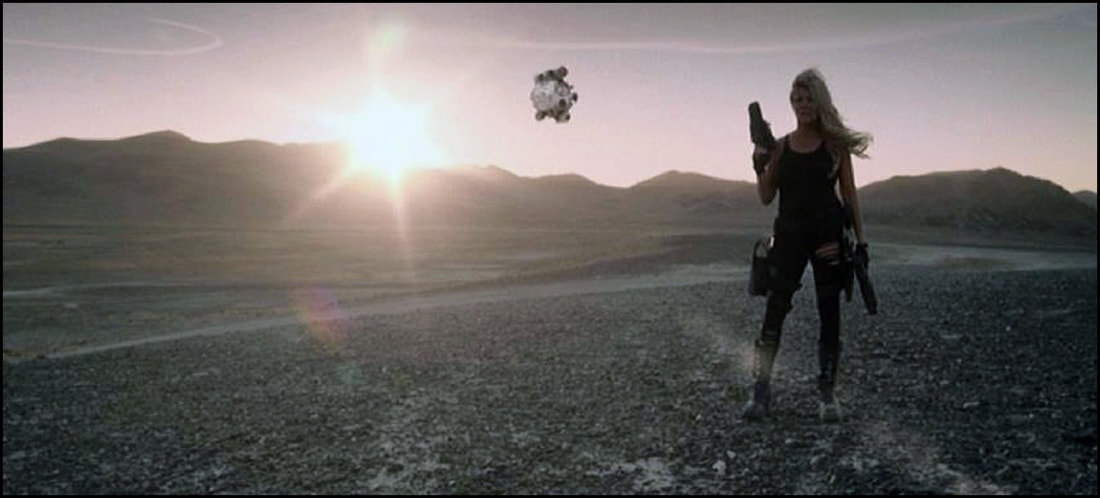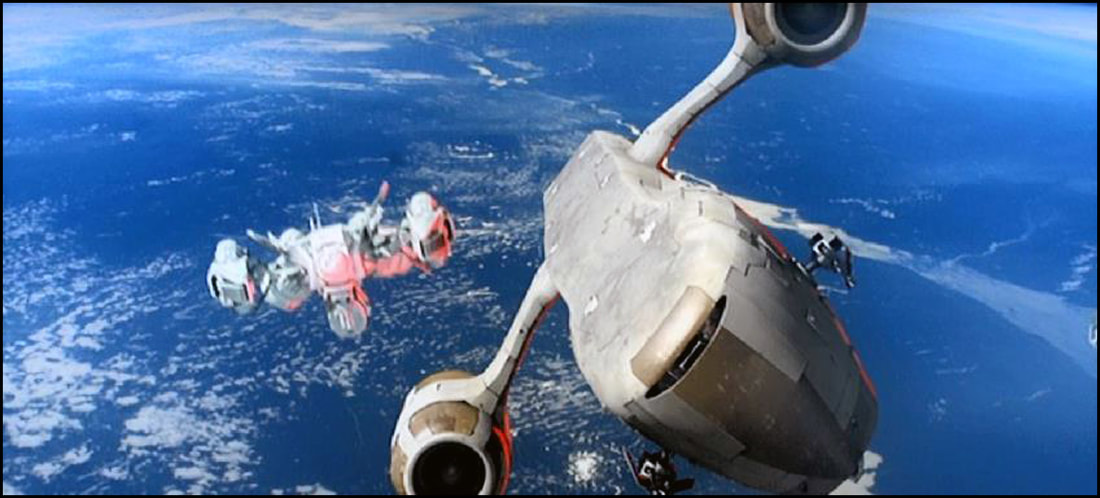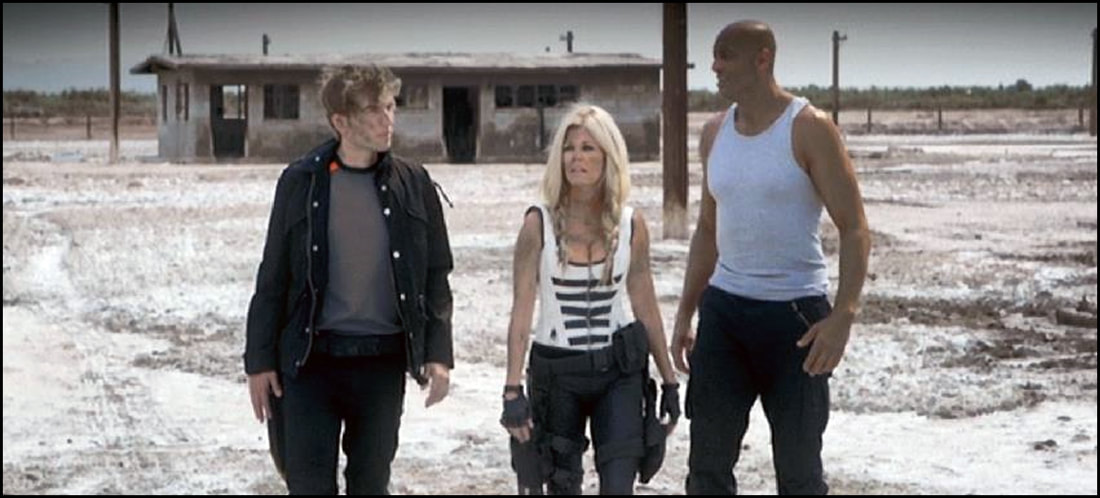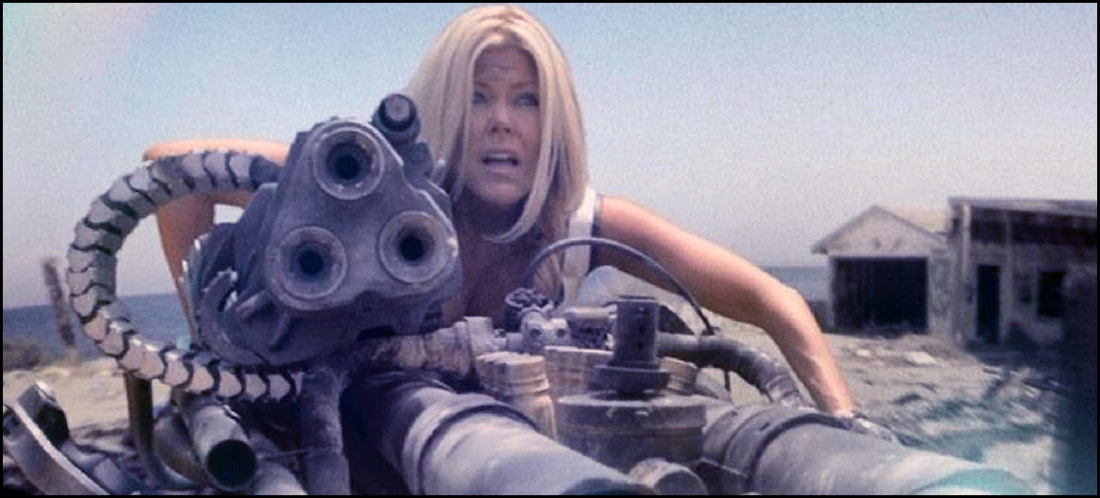Rogue Warrior Goes Rogue In Its Storytelling
As I’ve often opined, the traditional indie feature manages to tell a story without the typical studio influence – fewer chefs in the kitchen to muddle up the stew, less product placement to pull viewers out of the experience – and ends up generally delivering rawer content. Granted, it may be argued that no indie flick is perfect, but I’ve found giving a storyteller greater creative freedom to weave a suitable tapestry is rarely a bad thing. If nothing else, the picture will sink or swim on its own merits, and there’s nothing wrong with the artistic gamble from time to time.
Science fiction – on the other hand – is often a very hard sell on the indie circuit. Largely, this is because SciFi and/or Fantasy features more often than not require a healthy dose of special effects, and these efforts can add significant economic weight to any fledgling, small(ish) project before everything else is “in the can.” Practical effects rarely work as well as computer-generated ones, and audiences tend to shy away from any SciFi spectacle which looks less than spectacular.
Furthermore, the stuff of SciFi – things like artificial intelligence, augmented reality, or alien civilizations – have rarely fit within the standard indie mold. The truest SciFi relies on world-building, and indie flicks are thematically more geared toward tearing down world views, often aligned with heavy emotional consequence. Now, don’t get me wrong: some of the best Science Fiction products of, say, the last two generations have easily tinkered with the kind of existential angst one finds in grittier, more realistic films, but today’s mainstream audiences tend to respond better to these tropes being visually represented on the silver screen with more flash and sizzle needed to fuel a trilogy than any single artsy film. I couldn’t say why, but – for this reviewer – it’s refreshing to see so many heavily-laden CG projects collapse under the weight of their own pixels (i.e. 2015’s Jupiter Ascending comes to mind, along with the much more recent failure of 2017’s Valerian And The City Of A Thousand Planets, a film with words to spare in its title). Look no further than AMC’s Humans (or even the Swedish original Real Humans) to see that good SciFi can exist without all of those phasers, transporters, and warp core technobabble, much less their visual requirements.
And perhaps that’s why I found Neil Johnson’s ROGUE WARRIOR: ROBOT FIGHTER so confounding.
Succinctly, this is an indie picture than never quite looks like an indie picture. At times it does, but its graphics occasional hint at a major box office release. Visually, it’s astonishingly uneven, almost as if the story morphed from something it once was into something everyone discovered in-transit it could instead be. At times gritty and dystopian, I feel like ‘Rogue’ went rogue, its finished product falling right smack in that middle ground – the kind of place which used to be heavily populated with the traditional B-movie. But it both does and doesn’t look like a B-movie … does it?
“Sienna, a Rogue Warrior fighting a hyper-weaponized robot army, flees to the center of the galaxy in search of a mythical weapon that can neutralize any form of A.I. Pursued by giant machines, Sienna loses everything she cares about in an effort to save the last vestiges of humanity in an A.I. controlled universe."
Science fiction fans have a lot of respect for their motion pictures. They’ll happily swallow a bit of bilge from time to time so long as the payoff is worth the ride. They can be incredibly forgiving if they’re given something reasonable in exchange for the silence, be it some splashy action sequences, a fantastic lead performance, or a swelling symphonic score. More than perhaps any other genre, SciFi’s fanatics have fueled the success of such ongoing enterprises as Doctor Who, Star Wars, and Star Trek; and they’re always on the lookout for another.
Though it pushes a lot of the right stuff (pun intended), Rogue Warrior will likely not be that property. Writer/Director Neil Johnson stuffed his film with many of the usual ingredients – war-gutted worlds of tomorrow, gun-blazing robots, spaceships and starfields aplenty – but not all of this added up to a satisfying conclusion, even leaving the film open for more, a dreaded misnomer for the typical indie fare. The lovely Tracey Birdsall suitably headlines the space adventure, grounding it with a performance possibly as uneven as the narrative but still managing to command enough moxie to get an audience rooting for her along the way. I wanted to root for her more, and a stronger, more cohesive story might’ve accomplished that.
Perhaps the failure here is best attributed to a story that feels as derivative as it does diluted. Plenty of films have already explored mankind’s blighted future to great effect, and still more have peeled back the destructive layers of what happens once the machines we invent turn against us. Rogue is packed to the gills with ideas – Earth’s resistance, genetic manipulation, vengeance by proxy, etc. – and thinning the narrative herd here may’ve given Sienna a cause – one single, solitary cause – that better served the story from start to finish. But Johnson’s script meanders through an awful lot of smaller moments – a prison break, a secret origin, comically bumpy characters, and awkward sex (!!!) – and I found it hard to wrap my arms around what this heroine truly stood for much less what she needed (not ‘wanted’) to accomplish.
All of this said, Rogue Warrior isn’t a bad film, and – in truth – it’s far from it. (For the record, I’ve seen far, far worse film releases from far, far more reputable production companies and auteurs – here’s looking at you, Michael Bay.) As a story, it’s a bit jumbled with far too much exposition required to sell the premise, and the thinly drawn characters don’t serve the narrative the way they possibly could were the ideas and concepts here anchored more firmly. Sadly, a few scenes do come off a bit absurd as they’re clearly shot in a contemporary residence (and its backyard) while all other locations are understandably bombed out beyond oblivion.
I could make a strong argument that while the flick embraces a few tenets of the traditional B-movie it could be seen by hardcore SciFi fans and maybe even a fair share of the independent film circuit if for no better reason than to demonstrate what’s entirely possible these days with a modest budget. At times, the feature’s cinematography looks far too impressive for its own good, though some of the interiors end up getting washed out by way, way, way too much artistic lens flare.
Lastly, I’d be remiss if I failed to mention that Rogue has been the recipient of several awards on the festival circuit. While perhaps not garnering the critical praise all involved wanted, there’s something to be said for folks ‘in the know’ recognizing efforts worthy of distinction. I don’t always agree with those organizations, but – as I said – I’d give this one a thumb’s up for the effort: it definitely tried hard to be something special. My quibbles tend to revolve around the totality of the effort not delivering on its promise, but Johnson and Birdsall remain “ones to watch” in the territory of SciFi and Fantasy.
RECOMMENDED. While the story has a fair share of “been there, done that” moments, ROGUE WARRIOR: ROBOT FIGHTER manages to look fairly solid. Truth be told, I honestly believe a tighter cut could’ve vastly improved the pacing, especially given the script’s reliance on “telling” what happened versus “showing” (much of it the backstory). While imperfect, the film still boggles the mind over what’s possible with indie features in the modern age.





 RSS Feed
RSS Feed